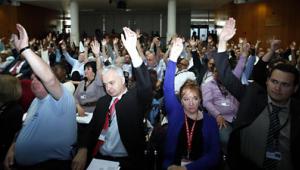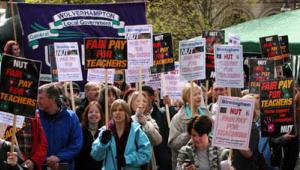20 April 2007
Swathes of public sector staff could be on a collision course with the government after a union leader said the Trades Union Congress is in 'serious discussions' over co-ordinated industrial action against government reforms.
Public sector union leaders will meet at the TUC in London on May 14 to discuss intensifying opposition to Prime Minister Tony Blair's and Chancellor Gordon Brown's reforms.
These include Brown's pay cap of 2%, more than 100,000 targeted job cuts and the further privatisation of services such as employment programmes.
Mark Serwotka, the general secretary of the Public and Commercial Services union, which represents the civil servants who are considering their second national strike this year, told Public Finance that it was likely that education unions would join Whitehall's in striking.
At their Easter conferences, both the National Union of Teachers and the National Association of Schoolmasters/Union of Women Teachers threatened industrial action over what they claim are real-terms pay cuts caused by Brown's cap.
The Royal College of Nursing this week also backed a call for industrial action unless ministers improve their 'insulting' 1.9% pay offer – comfortably below the 3.1% consumer price index for March.
Local government, health and other public unions have also been consulted.
Commenting on the possibility of widespread industrial action, Serwotka said: 'Far from opposition going away, this has all the potential to become more intense. Conditions are getting considerably worse for staff.
'We recognise that some of the issues we're fighting are common to other unions: particularly pay but also privatisation and job cuts.
'We have been to a meeting of the TUC where we argued for co-ordinated action across the public sector. The TUC is calling all public sector unions back in next month to respond to their consultations and… our line is that we will talk to other unions to encourage them [to take action].'
Legislations limits joint action by unions, for example by dividing pay bargaining units, but the PCS believes some form of co-ordinated action is possible.
Serwotka said civil servants' anger over reforms – which led to a national strike in January – intensified following a 'chaotic' meeting with Ministry of Defence employers on April 17.
Representatives from the PCS, Prospect and the mandarins' FDA union halted discussions after the MoD revealed plans for up to 11,500 new job cuts. The MoD's decision to impose a sixth successive annual pay deal contributed to the terse discussions, he added.
An MoD source said that the proposals were still at 'the planning stage.' But PF understands that two rounds of job cuts are planned over the next four years.
The first could cut a quarter of posts, I,400, at the MoD's London HQ. Meanwhile, a second project across the Defence Equipment and Support unit, recently created through the merger of the Defence Logistics Organisation and Defence Procurement Agency, could axe up to 10,000 posts.
Serwotka said the new MoD cuts, which cover the 2008/11 spending review period, increased the department's total job loss target to around 20,000 – compared to the 7,000 initially announced for the 2004/07 spending round.
The breakdown in talks at the MoD followed what Serwotka claimed was a 'fit of pique' from Cabinet secretary Sir Gus O'Donnell: an apparent refusal to enter into discussions over civil service pay and reform while the PCS continues to threaten strikes.
O'Donnell has called for an end to industrial action and a return to the negotiating table. But Serwotka claimed: 'Publicly he says one thing, but privately the Cabinet Office has shut up shop and will not talk to us. The Cabinet Office cancelled a pay meeting scheduled for this week.'
A Cabinet Office spokesman responded: 'We continue to look for constructive ways to take forward our relationship with the civil service unions.
'We are making good progress in our discussions with Prospect and the FDA and we have established topics for discussion with the PCS.
'To be successful bilateral discussions have to take place in a spirit of goodwill. Strike action by the PCS does not provide a basis for constructive dialogue.
'As such, we have postponed discussions with the PCS until their national action ceases.'
A TUC spokeswoman confirmed the May 14 meeting of the Public Sector Liaison Group. 'It will address, among other things, the recent phasing-in of public sector pay strategies and overall settlements,' she said.
However, she added that the TUC had not taken a stance over co-ordinated industrial action in the sector. 'There are a number of options open to our member unions in terms of where or how to take their [individual] issues forward.'
In the meantime, the PCS has reached an agreement with the Revenue and Customs department over two pilot schemes that will experiment with new flexible working practices for call centre staff. Up to 5,000 Revenue staff who were previously not covered by flexible working schemes could benefit if the pilots are rolled out across contact centres from June.
A PCS spokesman said the deal 'showed what could be achieved through effective consultation between departments and their staff'.
A Revenue spokeswoman last week told PF that the pilot regimes 'attempted to strike a balance between the needs of the business and the requirements of its staff'.
PFapr2007




















